I am a social scientist with over 25 years of experience in project management and monitoring & evaluations in development sector in Asia.
My contributions
Racism in the field of evaluation
Discussion

I am a social scientist with over 25 years of experience in project management and monitoring & evaluations in development sector in Asia.
Archana Sharma
Director BINDUDear Harvey,
I hail from India in the global south and have been in the development sector for about 30 years now. I would like to briefly highlight my experiences in the field of evaluations in response to your concerns:
Yes, systemic racism is there in the field and practice of evaluation. In fact, it exists everywhere; even in the high offices of the diversity and inclusion advocates; including EU & UN.
In my experience, the victims of racism are equally uncomfortable as evaluators, in talking about racism in our field as they would not like to offend the commissioners of the evaluations and in the process being sidelined and losing their assignments and jobs.
Rapid surveys, online surveys or detailed studies may be carried out in case someone is seriously interested in understanding as where we stand on this issue. Actions speak louder than words and therefore just keeping and making everyone sign on diversity and inclusion policies wouldn't deliver. The senior management need to practice it at every level to gradually change the equations if they really intend to change the scene in favour of the lesser privileged communities- be it black, brown yellow, tribal or any other such marginalized communities who have been on the receiving end of the discriminatory practices.
Yes, The Black-Lives-Matter movement is not new. It’s always been there, this time it caught the attention of the high and mighty due to multiple reasons...US impending election being just one of them. In fact, I have a black colleague from Kenya who is really disturbed by the attention given by media to BLM in US & Europe and not highlighting the real issues of Blacks in Africa and gender based violence is one that was mentioned by him on 11 June 2020...in his words " Mercy Cherono was Tied and Dragged on a motorcycle while a police beats her...for 10kms till her clothes got tattered on the road, she was half naked. But sorry we are busy protesting in the US ." I am sharing a news clip of that incident with you for your reference.
As evaluators, I would say we try to be enablers and would like to play an active role in the fields and also provide solutions. Unfortunately, in commissioned evaluations, our recommendations are hardly integrated in real practice as race comes into play at several levels. To begin with, a global north evaluator is generally preferred and the decision makers are aware of the reasons behind their choice. As far as "Qualifications & Experiences " are concerned ,the global south is already starting at a disadvantage. The inherent gap in capacities (including expertise in evaluation) of the global north vs. global south is going to stay as a result of various reasons and systemic discriminatory practices layered under fine prints. One obvious reason that I strongly oppose is candidates inability to prove any overseas experience As far as I am concerned, being an Indian; for the past three decades; I am generally assigned monitoring and evaluations assignments by the international agencies in India and have limited experience in neighbouring Nepal and Bangladesh. Unless, one is given a chance to undertake overseas assignments; one is never ever going to have that experience and this vicious cycle can never be broken and the gaps in skills, capacities, wealth, gender, assets, power equation etc. are going to stay forever. The Big Development Players are more interested in projecting the image that they have Diversity and Inclusion Policies in place in Black & White and never ever sincerely care to practice it to bring the lesser mortals at par with them.
Archana Sharma
Director, BINDU